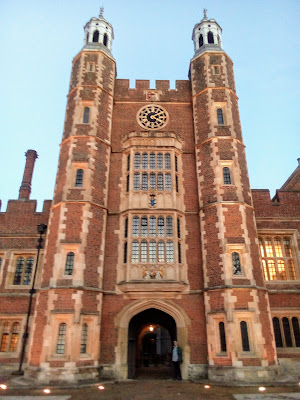Jennings meets Lord of the Flies. Toby Shadrach goes to prep school in the South of England while his home country of Lebanon degenerates from political instability into civil war. His boarding school life is a world of inter-dormitory warfare, of 'patrol leaders' (senior boys in charge of each dormitory) who become war-lords and force the juniors to toil for them as slaves, digging tunnels in the chalk hillsides outside the school and acting as infantrymen in the skirmishes. This is a feral world. As time goes on the economy of the schoolboys develops: fortunes are made and lost for highly prized objects such as torches (which can be used for torturing captives both by shining the light in their eyes and by clobbering them with it) or transistor radios; the markets for these possessions are manipulated by theft and bandit raids. Some boys are prepared to pay in 'trademarks' (the marks left after being hit by sticks). The masters seem remote from this anarchy, although they too can be brutal. At each step of the way, with deft flashbacks to the idyllic Lebanon that Toby has lost, parallels are made with the civil war in that country.
This is a carefully written cross between allegory and memoir. It is distinguished in part by its control and in part by moments of descriptive magic. It is Hanania's first novel (written in 1997) and has been followed by Unreal City (1999) and Eros Island (2000). The last is less controlled (sometimes I was confused) but the author has developed the lyricality of his descriptive passages to near-perfection.
A great read.
Selected quotes:
- Prelude
- “Though there was space ahead the traffic was staying clotted together, like clutches of a tune timid of breaking away into noise.” (p 3)
- “This was a capsule built to protect the future, a life hearse.” (p 4)
- “Whenever I returned now it was as a shabby tourist around my friends’ protected breeding programs and their bloodless dinner-tables.” (p 4)
- Part One
- “I had seen the dragon’s footprints in the bay beside the old port, near the little chapel where people left the old gloves, shoe, boots, though never in pairs.” (p 14)
- “ The buildings have that charred and pock-marked complexion common to northern variety theatres and station hotels.” ( p28)
- “The fruit in the wicker baskets is beginning to shrivel and harden. It gives off the same shrunk-fruit scent that hangs around the sideboard in so many other dining rooms of England ... Not a dead smell but a dying one.” (p 92)
- “The Fates are cruel, he says, because unlike the other gods they are deaf to the prayers of men.” (p 109)
- “I am the tyrant’s chef, and must contrive ever more exotic dishes to satisfy the appetites I have depraved.” (p 114)
- Part Two
- “This is a city of foreigners and if they all leave the city will be empty. Most of the natives are only foreigners who arrived early.” (p 177)
- “The rippleless flesh between her bright cotton halter-top and frayed jean-shorts was the colour of milk in shadow - when one can no longer tell whether the surface of the jug is liquid or skin.” (p 214)
Wonderful. May 2019

Hanania is one of literature's great recluses. He has continued to write large novels but refuses to publish them in protest at the madness of the world.
ReplyDelete